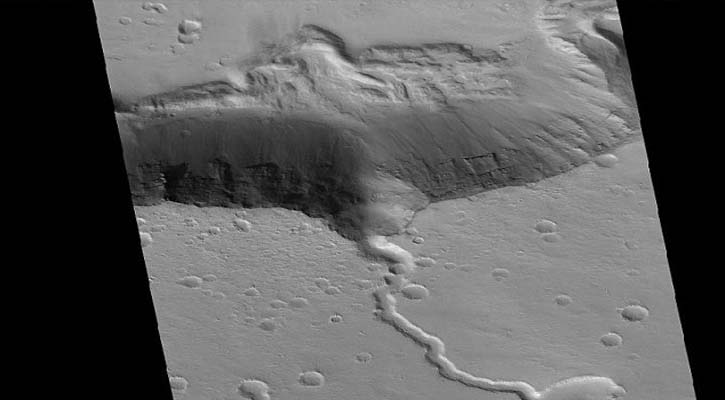Mars more like Earth than thought
4 || risingbd.com

Risingbd Desk: Mars' mantle may be more complicated than previously thought - making it far more similar to Earth, and potentially making it easier for Man to survive there.
Researchers analysed Elysium, a giant volcanic complex on Mars, the second largest behind Olympic Mons, which rises to twice the height of Earth's Mount Everest, or approximately 16 kilometers.
They found the red planet's mantle is far more similar the Earth's than thought.
They found that the unusual chemistry of lava flows around Elysium is consistent with an underlying mantle that melts at different temperatures as areas rise to the surface over time.
The findings indicate that Mars is a much more geologically complex body than originally thought, perhaps due to various loading effects on the mantle caused by the weight of giant volcanoes.
'We're discovering more variety in rock types and geochemical compositions, as seen across the Curiosity Rover's traverse in Gale Crater, and more potential for viable resource utilization and capacity to sustain a human population on Mars.
'It's much easier to survive on a complex planetary body bearing the mineral products of complex geology than on a simpler body like the moon or asteroids.'
The new study, published today in the Nature-affiliated journal Scientific Reports,fiound Elysium is more like Earth's Tibesti Mountains in Chad, the Emi Koussi in particular, than Everest.
This comparison is based on images of the region from the Mars Orbiter Camera, or MOC, aboard the Mars Global Surveyor, or MGS, Mission.
'Most of the volcanic features we look at on Mars are in the range of 3-4 billion years old,' Susko said.
'There are some patches of lava flows on Elysium that we estimate to be 3-4 million years old, so three orders of magnitude younger. In geologic timescales, 3 million years ago is like yesterday.'
In fact, Elysium's volcanoes hypothetically could still erupt, Susko said, although further research is needed to confirm this.
'At least, we can't yet rule out active volcanoes on Mars,' Susko said. 'Which is very exciting.'
Susko's work in particular reveals that the composition of volcanoes on Mars may evolve over their eruptive history.
Understanding the evolutionary history of Mars' mantle could help researchers gain a better understanding of what kinds of valuable ores and other materials could be found in the crust, as well as whether volcanic hazards could unexpectedly threaten human missions to Mars in the near future.
Mars' mantle likely has a very different history than Earth's mantle because the plate tectonics on Earth are absent on Mars as far as researchers know.
The history of the interior of the red planet also remains a mystery.
Risingbd/Feb 25, 2017/Mukul
risingbd.com






































